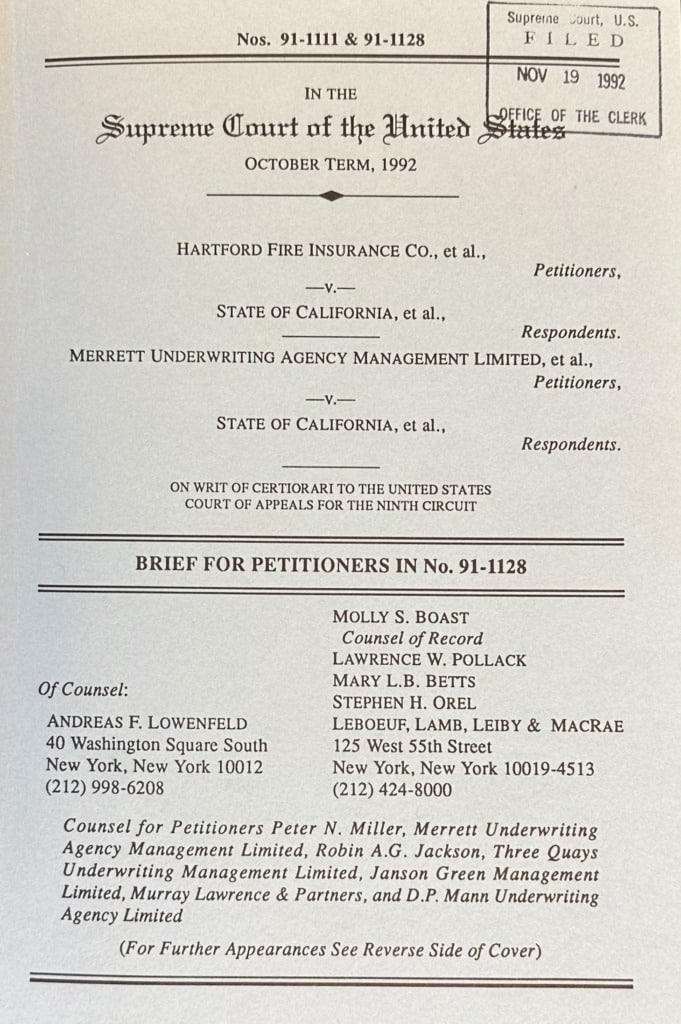Supreme Court Approves Using Civil RICO to Help Enforce Arbitral Awards
Last week, the Supreme Court held in Yegiazaryan v. Smagin that civil RICO can be used to help enforce foreign arbitral awards. Specifically, the Court held that concealing assets to avoid paying a U.S. judgment that confirmed a foreign arbitral award could satisfy civil RICO’s “domestic injury” requirement, allowing the award-creditor to pursue a claim…
Continue ReadingThrowback Thursday: Hartford Fire Insurance Co. v. California
Thirty years ago next week, the Supreme Court addressed the extraterritorial reach of U.S. antitrust laws in Hartford Fire Insurance Co. v. California. The Court reiterated that the Sherman Act applies to anticompetitive conduct abroad that causes substantial intended effects in the United States, but it divided sharply over the role of “international comity.” Writing…
Continue ReadingTagging Corporate Directors for Discovery under Section 1782
Section 1782 authorizes federal district courts to order any person who “resides or is found in” the judicial district to provide discovery “for use in a proceeding in a foreign or international tribunal.” The Second Circuit has held that “that § 1782’s ‘resides or is found’ language extends to the limits of personal jurisdiction consistent…
Continue ReadingDivided Fifth Circuit Panel Affirms Antisuit Injunction in Tragic Case
Normally, the fact that the Fifth Circuit affirmed an antisuit injunction would not be noteworthy. The Fifth Circuit is among the circuits that has adopted a liberal approach to antisuit injunctions, and all circuits review a district court’s decision to grant or deny such an injunction for abuse of discretion. But the decision in Ganpat…
Continue ReadingThe Homeward Trend in Chinese Choice-of-Law Cases
One of the characteristics of transnational litigation is that there is generally more than one forum in which the suit may be brought. Although TLB focuses primarily on transnational litigation in U.S. courts, it can sometimes be useful to look at what is going on in other systems where litigation might instead be filed. A…
Continue ReadingSupreme Court Finds Tech Companies Not Liable for Terrorism
Last week, the Supreme Court decided two cases in which plaintiffs alleged that social media companies aided and abetted international terrorism. In the first case, Twitter, Inc. v. Taamneh, the Justices unanimous interpreted the Antiterrorism Act’s (ATA) provision on aiding and abetting to require conscious and culpable participation. Plaintiffs’ allegations that ISIS used defendants’ social…
Continue ReadingExtraterritorial Application of Federal Securities Law After Morrison
In Morrison v. National Australia Bank (2010), the U.S. Supreme Court applied the presumption against extraterritoriality to the principal antifraud provision of the Securities Exchange Act, section 10(b). It held that section 10(b) applies “only [to] transactions in securities listed on domestic exchanges, and domestic transactions in other securities.” As I have explained elsewhere, Morrison…
Continue ReadingWhy the Indictment Against Halkbank Must Be Dismissed
In 2019, the United States indicted Turkiye Halk Bankasi (Halkbank), a Turkish state-owned bank, alleging a multiyear scheme to evade U.S. sanctions against Iran by using fraudulent transactions to transfer the proceeds of oil and gas sales to Iran. Last month, the Supreme Court rejected Halkbank’s claim of immunity under the Foreign Sovereign Immunities Act…
Continue ReadingDear Justice Gorsuch: There’s No Reason to Worry About the Remand in Halkbank
In Turkiye Halk Bankasi A.S. v. United States (Halkbank), the Supreme Court held that the Foreign Sovereign Immunities Act (FSIA) does not apply to criminal proceedings. The Court remanded the case to the Second Circuit to reconsider Halkbank’s claim of common law immunity. Justice Gorsuch, joined by Justice Alito, wrote a partial dissent. He would…
Continue ReadingSupreme Court Oral Argument in Extraterritorial RICO Case Marked by Confusion
The Supreme Court heard oral argument last week in Yegiazaryan v. Smagin and CMB Monaco v. Smagin, two cases testing when civil RICO can be used to help enforce a foreign arbitration award. Because I have described the facts in a previous post, I will be brief here. Smagin and Yegiazaryan are Russian citizens who…
Continue Reading








